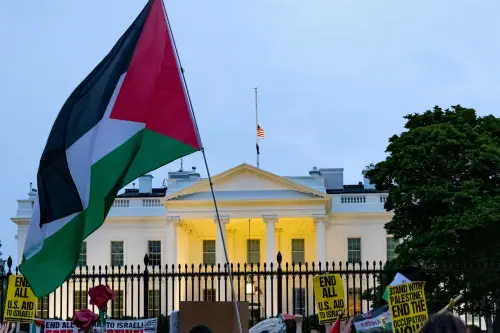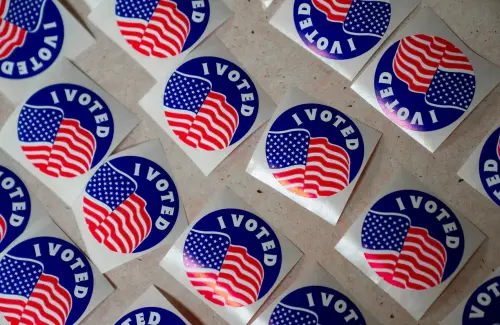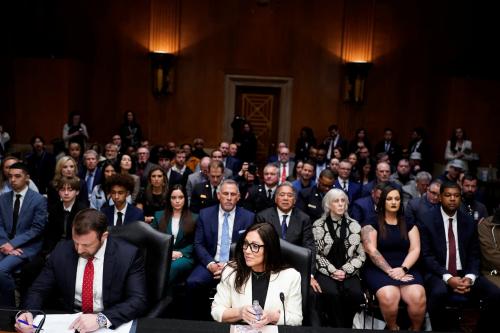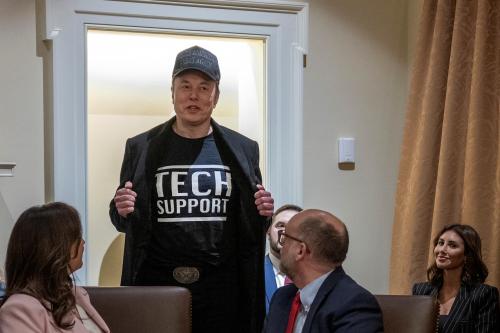Elon Musk appears to be stepping back from Washington to focus on his beleaguered car company, Tesla. In just over 100 days in office, Musk wreaked havoc across the federal government, with few agencies spared. From small entities like the U.S. Institute of Peace to massive, critical agencies such as the Social Security Administration, Musk’s DOGE teams swept in, firing civil servants and canceling contracts—often before Senate-confirmed officials were in place to provide oversight.
Musk leaves behind a stunned and demoralized workforce, with marginal savings at best. Although he pledged to cut $2 trillion from the federal budget, he ultimately reported achieving only a fraction of that—$160 billion. Independent analyses by journalists, however, suggest even that figure is inflated and riddled with accounting errors.
Musk’s downsizing efforts were accompanied by a torrent of insults leveled at civil servants, many of whom thought they were faithfully upholding the law and serving the public. At the U.S. Agency for International Development, staff were said to be part of a “criminal organization,” even though no evidence was ever provided to support that claim. Longtime government employees were reportedly asked to list five tasks they had completed that week or risk being fired. At the Department of Homeland Security, employees were asked to submit photos as proof of in-office attendance, while others were required to file daily reports noting whether they worked on site or remotely.
So, as Musk leaves, what is the state of play?
Much of the federal government is currently in disarray. Employees have been fired or incentivized to resign, and billions of dollars in federal contracts—covering medical research, cancer initiatives, university projects, and support for local libraries and museums—have been canceled. Many of the actions taken by DOGE are now the subject of litigation, with several dozen lawsuits filed alleging wrongful termination, lack of due process, privacy violations, and improper access to confidential databases. The DOGE campaign unfolded with little regard for decades of legal protections shielding civil servants from politically motivated dismissals. As a result, at least 31 lawsuits have been filed against DOGE actions alone, leading to a chaotic legal back-and-forth across multiple federal agencies.
Consider the Department of Agriculture. In early February, the New York Times reported that the agency had laid off 4,200 employees, including staff working on the federal response to the bird flu. Because Trump campaigned largely on lowering the cost of eggs and other groceries, controlling the spread of bird flu was critical to achieving that goal and became a presidential priority. The department soon began rehiring affected workers. Then, on March 5, the Merit Systems Protection Board ordered the USDA to temporarily reinstate 6,000 employees.
But bringing everyone back proved difficult. By mid-April, 16,000 Agriculture Department employees had already accepted the Department’s deferred resignation offer. Some left without providing contact information, making it hard for supervisors to reach them when attempting to rehire.
As of this writing, the Department of Agriculture remains short-staffed in addressing avian bird flu—one of the key issues tied to lowering egg prices. According to Government Executive, “Leadership at the Agriculture Department this week sent an email to staff throughout the Animal and Plant Health Inspection Service asking workers who accepted the administration’s Deferred Resignation Program—which enables them to remain on paid leave until they leave government by Sept. 30—to undo that decision.”
This uncertainty is unfolding across the federal government. At the Central Intelligence Agency (CIA), critics say the DOGE team revealed its naivete. In February, the CIA responded to a DOGE request for a list of all probationary employees by sending an unclassified email containing first names and initials of last names over to the DOGE offices. Observers quickly flagged the move as a potential intelligence windfall for adversaries—such as China, Russia, Iran, and North Korea—particularly given concerns that foreign actors may have access to U.S. communications systems.
DOGE also insisted, as it had across the federal government, that the CIA fire anyone working on diversity, equity, and inclusion (DEI) projects. In response, the agency shuttered its DEI office and dismissed its staff. However, a lawsuit filed by 19 former DEI employees was upheld by U.S. District Judge Anthony Trenga, allowing the workers to be reassigned to other positions. The cases added a new dimension to legal challenges against DOGE’s work. “They say this is to comply with the executive order, which is dumb because the executive order talks about ending DEI functions. It doesn’t say you have to fire DEI personnel,” said attorney Kevin Carroll, arguing that DEI roles are typically rotational assignments within the agency. “So, they can simply just reassign these people back to being an analyst or scientist or case office … instead of firing them. It’s arbitrary and capricious.”
This argument could apply across many agencies, where individuals with specialized backgrounds were recruited during the Biden administration to work on DEI efforts but possess skills and training aligned with the agencies’ broader missions.
So, what’s next?
Slowly but surely, Trump’s political appointees are being confirmed by the Senate and assuming control over federal agencies. Musk is departing, but many members of his team remain embedded in the government. Little is known about them, and many did not undergo traditional vetting or training. As a result, we can anticipate some interesting and potentially contentious internal conversations between President Trump’s legal representatives and the officials Musk left behind.
In some cases, Cabinet secretaries are asserting control by developing plans that comply with the law, increase transparency, and save money. Secretary Marco Rubio, one of the first cabinet secretaries to challenge Musk, has done just that. His proposal for reorganization of the State Department is a far cry from DOGE’s slash-and-burn approach. It is transparent. He identifies 132 offices for elimination and 700 positions to be phased out, with clear justifications. The proposal was shared with the Senate Foreign Relations and the House Foreign Affairs Committee for external review. Regardless of where one stands on the merits, the move signals Rubio’s intent to lead his department independently of DOGE’s recommendations.
Even Secretary of Defense Pete Hegseth, who has faced criticism over his lack of experience leading a department as large and complex as the Pentagon, has outlined a set of reorganization priorities for the Army. His proposals include merging U.S. Army North and South into one command focused on homeland defense. He also called for a major overhaul of the procurement system, an idea not seriously undertaken since the Clinton administration’s National Performance Review in the 1990s.
It’s also possible that the DOGE team, with Musk as their distant leader, will continue to identify what it considers wasteful functions and contracts. Going forward, however, such proposals will need to pass through Cabinet secretaries, undersecretaries, and a plethora of assistant secretaries. This added oversight should give subject-matter experts the opportunity to review decisions and ensure they are consistent with agency missions.
If Trump’s political appointees disagree with DOGE decisions and Musk intervenes—using his relationship with the president to advocate for his team—it could spark disputes with Cabinet secretaries that escalate quickly. But as any former White House staffer (myself included) can attest, very few of these disputes can be taken to the top without wearing out the president’s patience. All presidents believe they have more important things to do than mediate internal power struggles, and Trump is surely no exception.
In this situation, it will be harder for inexperienced DOGE operatives to bypass Cabinet opposition, as they lack the clout and financial muscle of Musk. While Musk could turn to social media, criticize his opponents, and leverage his wealth, the remaining DOGE staff will not yield the same power. Cabinet secretaries who likely once feared Musk will not be intimidated by the remaining DOGE team, making it easier for high-level political appointees to disregard DOGE recommendations they disagree with.
A third possibility is that the DOGE team integrates into the larger Trump administration within each agency, focusing on what they do best—technology. The federal government has struggled for years to keep up with the latest tech trends. This challenge is partly due to the government’s long history with computers, which has led to a reliance on outdated “legacy” systems, and partly because the government doesn’t pay enough to get top IT talent. At one point in an early Cabinet meeting, Musk wore a T-shirt that read, “tech support.” While they had bigger goals in mind, nothing could be more useful than helping modernize the federal government’s antiquated systems.
There will certainly be areas where, instead of cuts, Trump will seek to expand the workforce. Border patrol, for instance, will be a priority. In order to maintain the significant reduction in migration the nation is experiencing, he will likely push to modernize and strengthen border enforcement. This, however, is a difficult task, as previous administrations have found it challenging to recruit personnel for border work. Similarly, a recent spate of airline crashes may prompt some in the administration to push for more air traffic controllers, an area that has long been chronically understaffed. Additionally, cancer survivors and the lobbies that represent them (including those from Republican states) will soon recognize that Trump’s cuts to university research will negatively impact vital cancer research in their regions. As a result, expect strong pushback, along with renewed calls for funding in areas like disaster relief, veterans’ health care, and child welfare.
Regardless of what remains of DOGE, Congress has the power to override their actions. The current silence of the Republican majority should not obscure the fact that Congress holds the purse strings, controlling appropriations and ensuring that legislative spending priorities are met. It is likely that they will restore funding for critical areas like cancer research, defense, and other national priorities. Any savings Musk and his DOGE associates claim to have achieved may eventually be reinstated in the budget, meaning that despite staffing cuts and agency dismantling, the federal budget will likely continue to grow.
The Brookings Institution is committed to quality, independence, and impact.
We are supported by a diverse array of funders. In line with our values and policies, each Brookings publication represents the sole views of its author(s).








Commentary
What happens to DOGE when Elon Musk is gone?
May 5, 2025